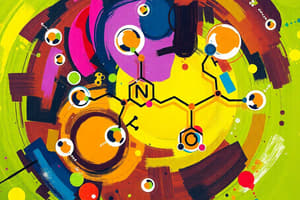Podcast
Questions and Answers
What is chemical kinetics?
What is chemical kinetics?
- The study of the speed at which chemical and physical processes take place (correct)
- The study of the structure of organic compounds
- The study of the behavior of gases
- The study of the composition of chemical substances
In chemical kinetics, what is the definition of reaction rate?
In chemical kinetics, what is the definition of reaction rate?
- The energy change in a chemical reaction
- The concentration of reactants at the start of a reaction
- The number of moles involved in a chemical reaction
- The amount of product that forms in a given interval of time or the amount of reactant that disappears in a given interval of time (correct)
What type of fission results in the formation of two ions, one negative and the other positive?
What type of fission results in the formation of two ions, one negative and the other positive?
- Homopolar fission encountered in homolytic reactions
- Heteropolar fission encountered in heterolytic or ionic reactions (correct)
- Symmetrical fission encountered in symmetrical reactions
- Asymmetrical fission encountered in asymmetrical reactions
What types of reactions do organic chemistry reactions proceed by?
What types of reactions do organic chemistry reactions proceed by?
At what rates do some reactions in geological processes occur?
At what rates do some reactions in geological processes occur?
What is chemical kinetics?
What is chemical kinetics?
In chemical kinetics, what is reaction rate?
In chemical kinetics, what is reaction rate?
At what rates do some reactions in geological processes occur?
At what rates do some reactions in geological processes occur?
What types of reactions do organic chemistry reactions proceed by?
What types of reactions do organic chemistry reactions proceed by?
What type of fission results in the formation of two ions, one negative and the other positive?
What type of fission results in the formation of two ions, one negative and the other positive?
What is solid state chemistry?
What is solid state chemistry?
What are the characteristics of a true solid?
What are the characteristics of a true solid?
How are atoms, ions, and molecules held together in solids?
How are atoms, ions, and molecules held together in solids?
How can solids generally be classified?
How can solids generally be classified?
What is the characteristic feature of a crystalline solid?
What is the characteristic feature of a crystalline solid?
Flashcards are hidden until you start studying




